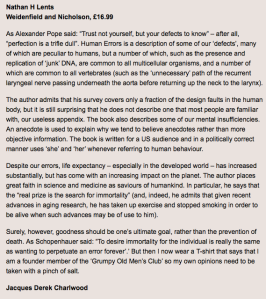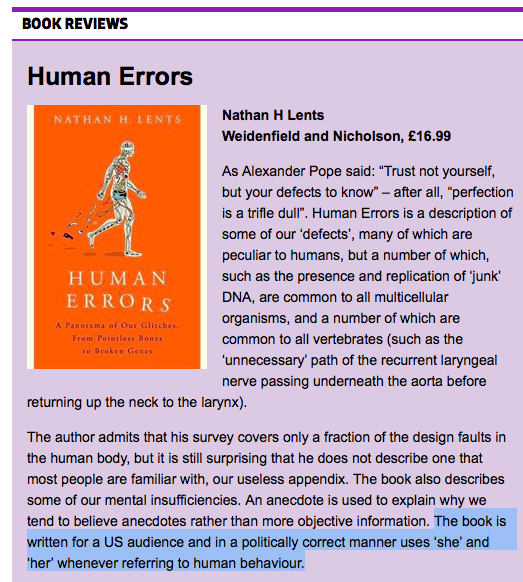Last fall, the first (and so far only) somewhat negative review of “Human Errors” was published. (I’m not counting all of the many articles written by creationist outlets.) You can read it here. And here is a screenshot:

As a writer (or a producer of anything, really) critique and negative feedback comes with the territory. It’s also true for scientists, particularly those in academia, because every grant we submit, article we publish, and book we write, is subjected to the rigors and indignity of peer review. Two or three experts, often competitors in the field, are invited to shred our work under the cover of anonymity and we have little choice but to address the critiques humbly, make requested revisions, and move on. I’ve had several articles outright rejected accompanied by nasty reviews that made me want to crawl in a hole. We all have. It toughens you up, to be sure.
So, five months after the publication date, when the first negative review of “Human Errors” came out, it shouldn’t have bothered me. I’m used to this. Not everyone will love my stuff and that’s totally okay. The book is selling well and I’m having a blast traveling the world promoting it. (The tour has taken me to Boston, San Francisco, Los Angeles, St. Louis, Chicago, London, Paris, Linz (Austria), Dubai, and, soon, Cheltenham, England – I feel like I’m dreaming!) Not only that, “Human Errors” has received plenty of positive reviews from outlets I respect like the WSJ, Discover magazine, The Guardian, The Times, Geographical, Kirkus, and so on.
I also recognize some of the shortcomings of the book and have a working list of tweaks and revisions that I plan to make in future printings. These are things raised by various Twitter folks, some friendly, some not. The point is, I can take harsh critiques. It’s been part of my professional life for more than two decades.
Back to the extremely short review. “The Biologist” is a fairly high-brow publication from the Royal Society of Biology in the UK. Despite that, it’s a bad review all around and I think it’s important to rebut the claims, so I’ll do that further down…
But first, there is one sentence thrown in that has absolutely no relevance to anything else in the review or anything in the book. At the end of the second paragraph, Dr. Jacques Derek Charlwood tacks on this sentence, “The book is written for a US audience and in a politically correct manner uses ‘she’ and ‘her’ whenever referring to human behaviour.”

The author had precious space in this tiny review, and yet he chose that as one of his 12 sentences? He is correct: when discussing a generic human, I sometimes use feminine pronouns instead of always defaulting to male ones, especially when talking about a hypothetical scientist, a field in which women are woefully underrepresented. For example, I might say something like, “A good scientist will test her ideas by…” So what?
To be sure, I do this with purpose, but what I don’t get is, why does this bother Dr. Charlwood so much that he feels the need to react to it? The book has 8 chapters, over 100k words, and plenty of controversial claims that I fully expect resistance to. In the tiny little space he had, most of the book’s chapters were ignored, but his critique of my pronoun use ranked as a chief concern that had to be stated. Maybe it’s not his style, but what is the offense in using feminine pronouns to describe a generic person?
Rarely is “politically correct” used as a compliment, so one can only infer that Dr. Charlwood is annoyed by my deviance from the tradition of defaulting to male pronouns. That’s a shame because, as writers, choosing more inclusive words is literally the least we can do when it comes to gender equality. That such a small gesture of inclusion elicits a knee-jerk reaction underscores how important this is to do. Prior to this, I did not give this issue much thought, but you can bet I will now. So I guess something good did come out of this otherwise thoughtless review.
Okay, now back to why I think the substance of this review is also poor. First, the author complains that I don’t include the appendix as a “well known useless organ.” First of all, if it’s already well known, why would I include it? Secondly, there is good evidence that the appendix plays an important, if accidental, role as a reservoir of healthy intestinal bacteria, a fact easily discoverable in the first few hits of a Google search. Those who have had appendectomies are at elevated risk of developing colitis. So the matter of the appendix as useless or poor design isn’t fully clear yet, so I didn’t include it.
Next, he complains that I use an anecdote to explain our over-reliance on anecdotes. That’s called illustrating the point, but what he fails to mention is that I follow it up with discussions of, and references to, published studies.
Further down, he complains about my praise for research into aging and immortality and maintains that this is not an admirable goal, and so on. He misunderstood what I meant, but also, who doesn’t hope for a long and healthy life? My real irritation here is that this issue of immortality, on which he dedicates three of his 12 sentences (25%!), is not in any way core to the book. This was in the epilogue chapter where I muse, even ramble on a bit, about the future of our evolution, given the flaws that I discussed in the previous six chapters.
So this review commented on almost none of the detailed content from the six “meaty” chapters, filled with plenty of controversial claims that could be challenged. Instead he pecked around the margins taking issue with material in the conclusion. Accordingly, he left the main thesis of the book entirely unaddressed, that we can use our glitches/quirks/flaws to deduce interesting things about our past… that’s the big idea of this book. All of the many other published reviews tussle with this thesis, but not a peep from Dr. Charlwood. Maybe he was too busy stewing in his own juices over those feminine pronouns.
***
This review reminded me of the one negative review that I received for my first book, Not So Different (again, not counting the creationists, such as Ken Ham). This one is even weirder, but good luck finding it. No library at CUNY subscribes to “The European Legacy” so I had to request the review from interlibrary loan. (Email me privately if you want a copy. My posting the PDF here would be a violation of copyright laws.)
The very first sentence of the review is, “Nathan Lents comes out of the closet flying in Not So Different, acknowledging his “always- encouraging husband Oscar” (ix) in his Acknowledgments, and…”

Um, excuse me? I didn’t know I was in the closet to begin with! And whatever does that have to do with anything? Why is it worthy of mention in a book review? In the acknowledgements, a section that almost no one reads, most authors thank their family, friends, colleagues, etc., and I thanked mine. It has nothing to do with the content of the book. This delightful little non sequitur has no bearing on the rest of Dr. Stanley Shostak’s review.
Or does it?
We have to ask ourselves, why does Dr. Stanley Shostak find this important to note as the very first sentence of his review? What is he trying to signal to his readers? Is this a habit of his? Because I, for one, have never seen a review that begins with a jocular note about the sexuality of the author.
I don’t believe that this is an off-handed comment. It suggests, at least to me, that he thinks my sexuality is somehow important to understanding the book, that it is written through some sort of “gay lens.” If he thinks that, then it makes sense that he would start his review that way. Dr. Shostak may mean this as a warning: “Attention! Gay propaganda ahead!”
Some may even find that fair because I explore the “romantic lives” of various animal species, both the sexual behaviors themselves but also pair-bonding and attachment. I do this in order to draw parallels with the human experience and I am hardly the first to do so. When one objectively reports on the sex lives of animals, it would be bad science to leave out the fact that most or all species engage in same-sex sexual activity and that many are known to form stable same-sex pair bonds. (If you want to more about that, I guess you’ll just have to read the book!)
But to some, this is all agenda-driven and I think that’s what he is trying to signal here. The reality, of course, is that all of the same-sex sexual activity that is so easy to see and document was deliberately underreported for centuries – that is where you find an agenda. I am not out on a limb here. All of this is pretty well established among those who study animal behavior, but Shostak apparently doesn’t buy it. Rather than attempting to rebut the points I raise and the research I cite, however, he puts me in a closet so that he can pull me out of it and say, “Gay!”
To be perfectly clear, the very notion that I am “coming out of the closet” simply because I thanked my husband in a section of the book that no one reads is strange and offensive. I haven’t been in the closet since I was 20 years old. Not only that, the closet is a painful, isolating, and humiliating experience. I don’t think I’m a bleeding heart or a snowflake for thinking that maybe the closet shouldn’t be the subject of mockery in an academic journal.
Dr. Shostak didn’t just inform his readers that I was gay because, presumably, that should matter to them. He deliberately used the closet metaphor. Is it because that’s where he thinks I belong? Too bad for you, Dr. Shostak. I clawed my way out of that closet decades ago and I’m not going back in.
And those are, to date, the only two negative published reviews of my books. The common thread is rather obvious: reactionary politics around sex and gender. It therefore appears that the main opponents of my work are creationists and socially conservative reactionaries. I’m rather okay with that. 🙂
-NHL

It’s an ad hominem from a crank. I shouldn’t worry about it. 🙂 Zoe Butler
>
LikeLiked by 2 people
i dont understand a “journal” which considers an ad hominem attack on an author at all relevant to a book review. i’d need to research the reviewer and the journal a bit more, before making definitive statements on his and their biases, but i’d be willing to make a wager in advance.
LikeLike
Yeah, it’s not exactly an influential journal. But it is with a professional and respected publishing house.
LikeLike